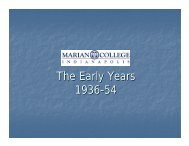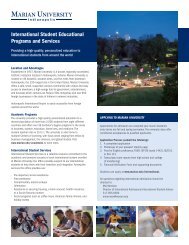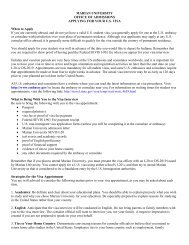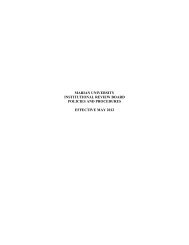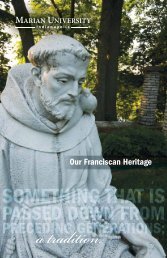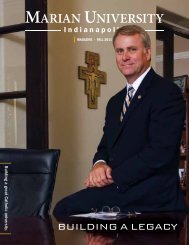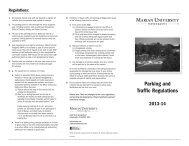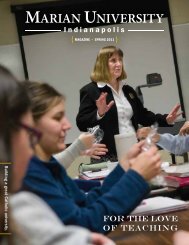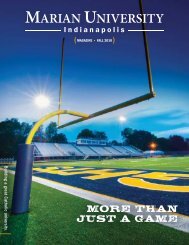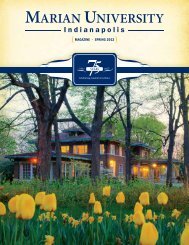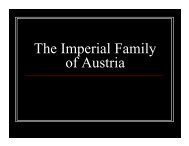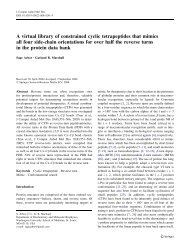Download - Marian University
Download - Marian University
Download - Marian University
Create successful ePaper yourself
Turn your PDF publications into a flip-book with our unique Google optimized e-Paper software.
End Note<br />
Liberal Arts: The Search for Meaning through Culture<br />
by James Larner, M.M., Ph.D.<br />
As we celebrate the 75th anniversary of<br />
<strong>Marian</strong> <strong>University</strong> in Indianapolis, it seems appropriate to reflect on what<br />
makes an education from <strong>Marian</strong> <strong>University</strong> distinctive. Of course, the first<br />
thing that comes to mind is our Catholic identity. But what also sets us<br />
apart from other institutions is our commitment to a liberal arts education.<br />
This emphasis on the liberal arts provides our students with life skills<br />
that reach beyond any chosen career path and explores common themes<br />
experienced by human beings through the ages.<br />
Each student at <strong>Marian</strong> <strong>University</strong> takes courses required in the general<br />
education curriculum. These courses assure a well-rounded education and<br />
a firm grounding in the liberal arts. One of the most distinctive courses<br />
is Humanities, an interdisciplinary course, team taught by professors of<br />
music, art, and literature. At other institutions, this type of course is taught<br />
as a broad overview of western culture, where students become culturally<br />
literate by learning to identify masterworks of the past.<br />
Cultural literacy is very important, but in our humanities course it is only<br />
the first level of engagement. The subtitle of the course is “The Search<br />
for Meaning through Culture,” which accurately describes a major goal of<br />
the course. This fall, nearly 200 students will read the epic of Gilgamesh.<br />
Most scholars agree that this story is based on an actual human being<br />
who lived around 2800 B.C.E in Uruk—present day Iraq. According to the<br />
legend, Gilgamesh is a powerful young king and although he protects his<br />
people from outside forces, he is an arrogant and abusive king. The people<br />
of Uruk pray to the gods for help. The gods intervene by sending Gilgamesh<br />
a friend with whom he shares many adventures. When his friend suddenly<br />
dies, Gilgamesh experiences such mourning that he decides to go on a<br />
quest for immortality. I don’t suppose it will surprise you to learn that he<br />
doesn’t achieve immortality—and yet here we are 5,000 years later talking<br />
about him. Why is Gilgamesh still remembered after all these years He is<br />
remembered for the transformation he experiences on his journey. He sets<br />
off on a quest which seemingly ends in failure, but through his journey he<br />
learns a far more important lesson. He comes back to Uruk a benevolent<br />
and beloved king and thus does, in a way, achieve the immortality<br />
he sought.<br />
So what do <strong>Marian</strong> <strong>University</strong> students learn from studying Gilgamesh<br />
We can look at the various levels of learning that take place. The first level<br />
is the level of cultural literacy. This is the Jeopardy level. Students will<br />
know that Gilgamesh was a king who lived long ago and went on a quest<br />
for immortality. Beyond this level, they will learn about the cultural values<br />
and concerns of an ancient civilization. They will learn about the art and<br />
the music of those people and what they were trying to communicate<br />
to the world. Next is a deeper level where students are able to interpret<br />
Gilgamesh’s journey as a metaphor for someone who had to endure many<br />
trials to learn how to become fully human. And finally, students learn how<br />
to explore the lessons of Gilgamesh and apply them to their own lives and<br />
the world around them. That is “the search for meaning through culture.”<br />
Like Gilgamesh, our students are on a difficult quest—to earn a degree.<br />
Like Gilgamesh, they may have lofty goals—maybe to become the chief<br />
executive officer of a Fortune 500 company. Progressing toward their<br />
goal they will face many challenges, successes, and failures. How they<br />
deal with those experiences will reveal their underlying character. With an<br />
emphasis on the liberal arts, <strong>Marian</strong> <strong>University</strong> prepares students to assess<br />
challenges from multiple perspectives. I hope we all agree that we don’t<br />
want our leaders making decisions based solely on “the bottom line,” or<br />
worse, making decisions based on personal gain. We need leaders who<br />
can evaluate a situation from multiple perspectives. We need leaders with<br />
a strong moral and ethical foundation. We need leaders who have learned<br />
and value the quality of empathy—the ability to have insight, respect,<br />
and compassion for others. The liberal arts foundation that <strong>Marian</strong><br />
<strong>University</strong> provides prepares our students to make well-informed,<br />
values-based decisions.<br />
There is more and more emphasis on professional instruction in higher<br />
education today—and certainly that is very important—but there is also a<br />
danger in placing too much emphasis on the transitory nature of career<br />
preparation. The pace at which the practical knowledge of a vocation is<br />
changing is unprecedented. Information that freshmen learn may well be<br />
obsolete by the time they are seniors. The advent of the computer age<br />
has changed every profession—but has it changed the lessons learned<br />
from Homer and Dante Has it made the music of Bach and Beethoven<br />
or the art of Michelangelo and Van Gogh obsolete There are elements of<br />
learning that are timeless. In fact, we might say the lessons of the great<br />
works are actually timely in that they evolve throughout our lifetime. Think<br />
for a moment of an influential book that you have read more than once.<br />
Did the message of the book evolve with repeated readings<br />
I’m reminded of a quote attributed to Oscar Wilde. We don’t want to<br />
graduate students who “know the price of everything and the value of<br />
nothing.” Through a liberal arts education, our students learn values<br />
necessary to create a better world. And <strong>Marian</strong> <strong>University</strong> is creating<br />
a better world by transforming lives—one student at a time. This is<br />
our goal. This is what makes an education from <strong>Marian</strong> <strong>University</strong><br />
truly distinctive.<br />
James Larner, M.M., Ph.D.<br />
is an associate professor<br />
of music and chair of the<br />
Department of Performing<br />
Arts in the <strong>Marian</strong><br />
<strong>University</strong> School of Liberal<br />
Arts. He can be reached<br />
at jlarner@marian.edu.



